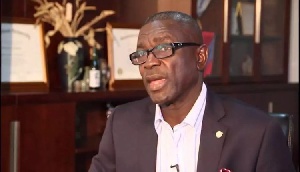 Prince Kofi Amoabeng is founder and CEO of defunct UT Bank
Prince Kofi Amoabeng is founder and CEO of defunct UT Bank
The collapse of UT Bank is having a negative domino effect on all other businesses under the UT Group, former CEO of UT Bank Prince Kofi Amoabeng has said.
GCB Bank took over UT Bank and Capital Bank in August 2017. The Bank of Ghana confirmed the takeover, announcing that it had “approved a Purchase and Assumption transaction with GCB Bank Ltd. that transfers all deposits and selected assets of UT Bank Ltd. and Capital Bank Ltd. to GCB Bank Ltd.”
According to Governor of the BoG, Dr Ernest Addison, “UT Bank and Capital Bank were requested to submit restructuring and capital restoration plans. However, plans submitted were found to be unacceptable.
A pro-forma balance sheet of liabilities to be taken and assets to be purchased were prepared and a pool of bidders was asked to express interest. GCB Bank was then selected among three others on the basis of purchase price, cost of funding, branches to be retained, staff to be employed, and impacting the acquiring bank’s capital adequacy ratio”.
Responding to the collapse of the bank for the first time, Mr Amoabeng, in a statement, said: “The actions so far taken by the central bank have adversely affected the operations of the remaining group of companies of UT.
“The UT brand which was previously a super brand a few years ago, has been totally defamed. The situation has, for instance, led to difficulties in the servicing of payments due investors.
“More importantly to me today though, is the inability of several workers who once prided themselves as UT staff and now have little or nothing to show for their years of dedication and service; the negative impact on the other UT companies in the eyes of investors who believed in us and our vision to see a Ghanaian owned company become a successful global brand.
“I will continue to co-operate with all state agencies probing the development for finality to be brought to this matter”, Mr Amoabeng added.
Below is the full statement: